
Why Books Still Matter When It Comes to Money
Financial judgment isn’t just about calculators and spreadsheets. It’s a reflection of habits, values and patterns learned over time. Books offer something social media posts and short articles can’t — a deep dive into how money really works. Personal finance classics and economic case studies explore the reasoning behind financial decisions which helps sharpen thinking rather than just give answers.
The best financial minds, whether investors or economists, are often avid readers. They don’t just chase trends. They revisit histories of crashes and recoveries, analyze past mistakes, and reflect on the psychological side of money. Through Zlibrary people can reach a vast and diverse book collection that covers everything from household budgeting to the complexities of market bubbles. This sort of broad access is key for anyone aiming to grow in financial confidence without being swept up by hype.
Reading Builds Patterns Not Panic
Emotional spending, poor saving habits or being quick to invest based on a headline — these are less likely to happen when someone has a library of ideas to pull from. Books train the brain to pause, compare, and consider. The benefit isn’t just the information but the rhythm of learning itself. Page by page readers gain patience which is gold in the world of finance.
Take for instance the slow build of a story in a biography of an investor. It doesn’t rush. It shows missteps, wrong turns, and lessons learned the hard way. That kind of narrative can mirror the real-life experience of managing personal money. Rushing less means panicking less and that matters when everyone else is chasing the next big thing.
Building a Practical Toolkit Through Reading
The wisdom tucked inside finance books isn’t always about formulas or rules. It’s often about mindset. Some titles read more like character studies — portraits of people making high-stakes decisions in uncertain times. Reading gives a front-row seat to these moments which is invaluable for shaping one’s own approach.
Here’s where the long game becomes clear:
- Recognizing Bias in Financial Thinking
Books make it easier to spot familiar traps. Overconfidence, herd mentality, and loss aversion are patterns that appear again and again in stories about business and investing. When readers notice them on the page they’re more likely to catch them in real life too.
- Understanding Global Perspectives
Finance isn’t local anymore. Books offer a passport into economies that function under different rules and pressures. Reading about other systems builds flexibility and broadens the scope of what’s possible, and what’s risky.
- Translating Concepts into Daily Decisions
A budget is more than numbers on a sheet. A book might show how one choice, such as eating out or cooking at home, cascades into long-term effects on savings, lifestyle, and goals. Seeing these links drawn out helps turn vague ideas into real behavior changes.
his toolkit isn’t something handed over in one go. It grows as more stories and studies are absorbed. One reliable source that provides open access to financial literature and thought-provoking content is https://www.reddit.com/r/zlibrary/wiki/index/access/ which can help readers expand that toolkit further without running into paywalls.
Turning Pages into Judgment Calls
What reading really offers is distance — the space between impulse and action. With enough stories, facts, and frameworks rattling around the brain people don’t jump at the first shiny offer. They wait to ask sharper questions and make decisions grounded in context not emotion.
And sometimes the best insight doesn’t come from a finance book at all. It comes from a memoir about failure or a novel about ambition. These stories carry truths about risk trust and value that echo in every budget and investment plan. A sharp mind doesn’t just track markets. It sees patterns in human behavior and knows when to stay in the game or walk away.
Knowledge may not guarantee perfect financial choices every time but it sure makes them better than a shot in the dark. Reading gives people the light to see what’s coming and the perspective to know what matters most.




























